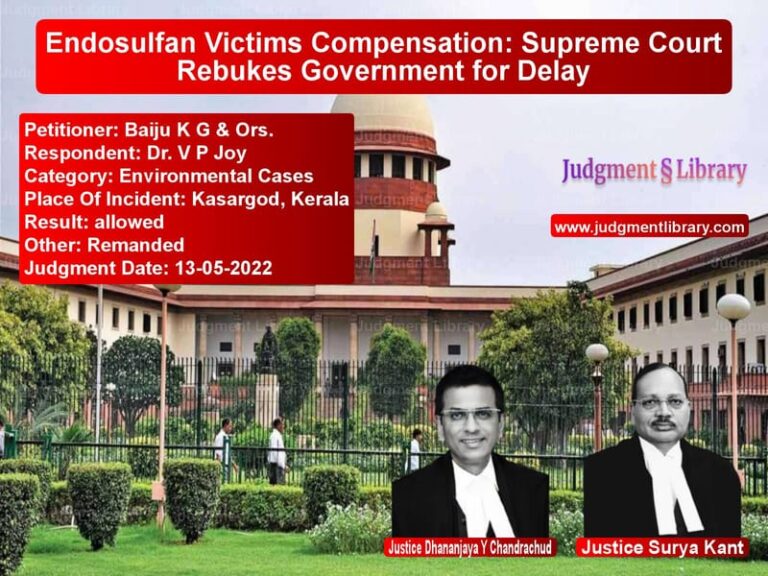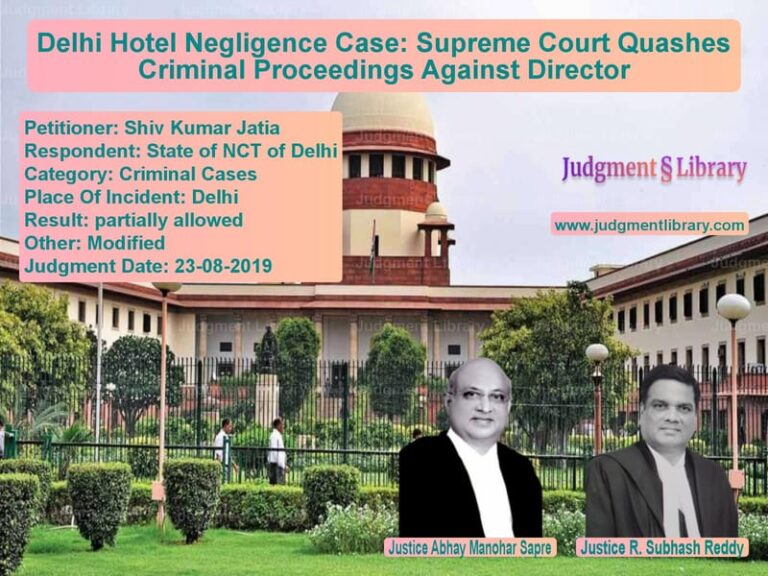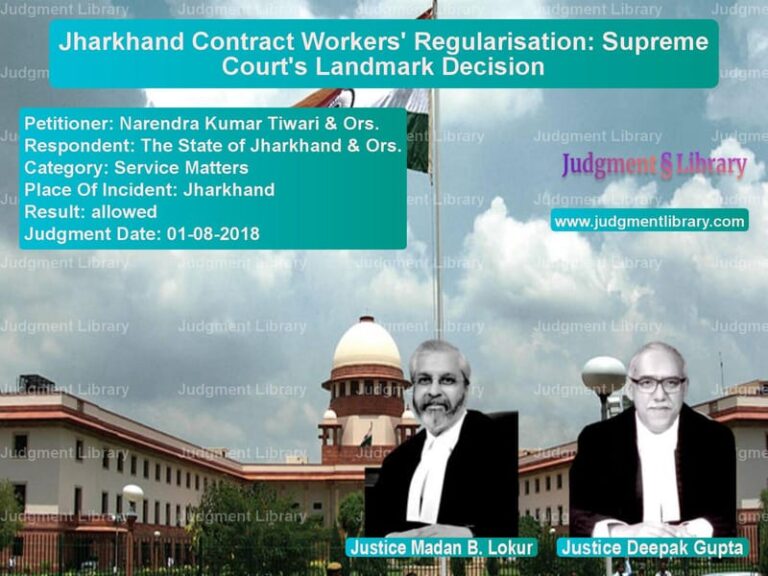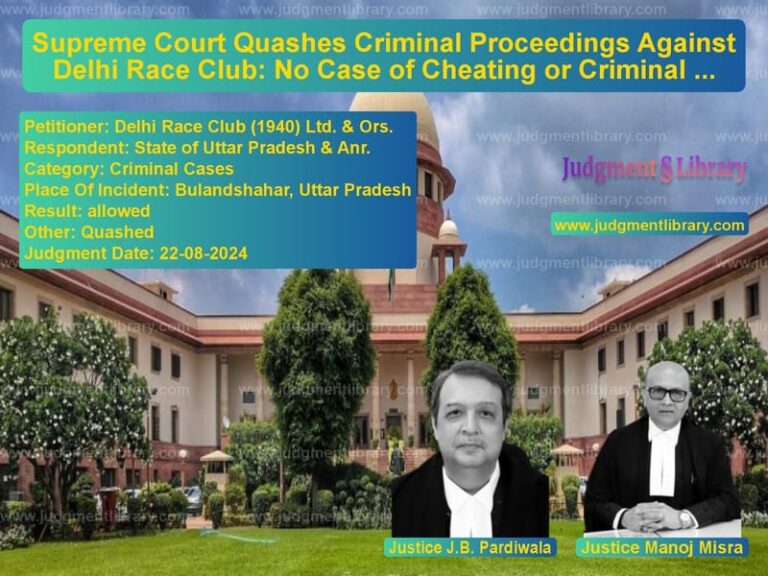Supreme Court Reinstates Conviction in Karnataka Corruption Case: Analysis of Key Arguments
In a significant judgment delivered on April 16, 2025, the Supreme Court of India overturned the acquittal of a government official in a corruption case dating back to 1995. The case, State of Karnataka vs Nagesh, involved allegations of bribery against a Village Accountant in Belgaum district and presented important questions about the standard of proof required in corruption cases and the appellate court’s scope of interference with trial court findings.
The case originated from events in 1995 when the complainant approached the accused, a Village Accountant in Kadoli, regarding mutation of land records. According to the prosecution, the accused demanded Rs. 2,000 as bribe, which was later negotiated down to Rs. 1,500. When the complainant expressed inability to pay the full amount immediately, they allegedly settled on Rs. 500 upfront with the balance to be paid later. The complainant reported this to the Lokayukta police, leading to a trap being laid where the accused was allegedly caught accepting the bribe.
The trial court in 2006 convicted the accused under Sections 7 and 13(1)(d) read with Section 13(2) of the Prevention of Corruption Act, 1988, sentencing him to one year rigorous imprisonment and a fine of Rs. 500 for each offence. However, the Karnataka High Court in 2012 reversed this conviction, acquitting the accused primarily on grounds of discrepancies in witness testimonies and doubts about the demand and acceptance of bribe.
The Supreme Court bench comprising Justices Bela M. Trivedi and Prasanna B. Varale carefully examined the case records and found that the High Court had erred in its appreciation of evidence. The Court noted: “The High Court gave an undue importance to the minor discrepancies and failed to appreciate the trust-worthy evidence in the form of ocular testimony of the witnesses as well as the documentary evidence.”
One of the key issues was the High Court’s treatment of witness discrepancies. The Supreme Court observed that the incident occurred in 1995 while witnesses were examined in 2005-06, making minor inconsistencies understandable. The Court quoted the trial judge’s observation: “The court is of the view that the trap is dated 07.04.1995 and PW1 is examined before the court on 24.03.2005 i.e. almost after 10 years. Hence, possibility of lapse of memory regarding the names of panchas and the date of trap cannot be ruled out.”
The Supreme Court particularly emphasized the importance of the shadow witness’s (PW2) testimony, which the High Court had allegedly ignored. PW2 had consistently stated that the accused accepted the money, counted it, and kept it in his pocket. The Court noted: “PW2 stated before the court ‘the police washed both the hand fingers of accused in washing soda solution of white colour, and thereafter it changed to kempu gulabi colour and it was seized separately in 2 bottles. He further stated before the Court that the police also seized the accused pant and marked the right pocket by ball pen’.”
Regarding the presumption under Section 20 of the Prevention of Corruption Act, the Court clarified: “The High Court observed that the oral evidence on record does not satisfactorily establish either the demand or acceptance of bribe by the accused. Therefore, Section 20 of the Act has no application to the facts of the case.” The Supreme Court found this conclusion erroneous as the prosecution had indeed established both demand and acceptance.
The judgment also dealt with the accused’s argument about reducing the sentence due to the passage of time. The Court noted that the accused had enjoyed liberty throughout the trial and appeal process and thus saw no reason to show leniency in sentencing. It upheld the trial court’s sentence of one year rigorous imprisonment and fine for both offences.
This judgment reinforces several important principles in corruption cases: the need for appellate courts to exercise restraint in interfering with trial court findings based on witness credibility; the understanding that minor discrepancies after long periods are natural; and the importance of giving due weight to statutory presumptions under the Prevention of Corruption Act.
The Supreme Court’s decision to reinstate the conviction serves as a reminder of the judiciary’s role in maintaining accountability in public service and the careful scrutiny required when dealing with corruption cases, even those with long pendency periods.
Petitioner Name: State of Karnataka.Respondent Name: Nagesh.Judgment By: Justice BELA M. TRIVEDI, Justice PRASANNA B. VARALE.Place Of Incident: Belgaum, Karnataka.Judgment Date: 15-04-2025.Result: allowed.
Don’t miss out on the full details! Download the complete judgment in PDF format below and gain valuable insights instantly!
Download Judgment: state-of-karnataka-vs-nagesh-supreme-court-of-india-judgment-dated-15-04-2025.pdf
Directly Download Judgment: Directly download this Judgment
See all petitions in Fraud and Forgery
See all petitions in Public Sector Employees
See all petitions in Disciplinary Proceedings
See all petitions in Judgment by Bela M. Trivedi
See all petitions in Judgment by Prasanna Bhalachandra Varale
See all petitions in allowed
See all petitions in supreme court of India judgments April 2025
See all petitions in 2025 judgments
See all posts in Criminal Cases Category
See all allowed petitions in Criminal Cases Category
See all Dismissed petitions in Criminal Cases Category
See all partially allowed petitions in Criminal Cases Category







